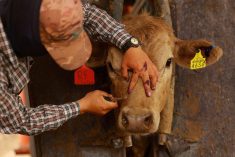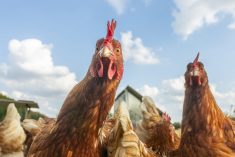Any calls by Canadian hog producers for government help would be more acceptable to their U.S. counterparts if the calls were for herd reduction programs, rather than direct subsidies.
North Carolina producer Don Butler, the president of the National Pork Producers Council, speaking on the Prairie hog industry-sponsored program Farmscape, said calls from Canadian hog farmers for government assistance, if answered, would have trade implications.
Directors of the Canadian Pork Council recently appeared before the House of Commons’ agriculture committee, where they said the hog sector’s recovery “will depend on how well the industry and the government react to this extraordinary situation.”
Read Also

U.S. livestock: Cattle strength continues
Cattle futures on the Chicago Mercantile Exchange were stronger on Friday, hitting fresh highs to end the week.
Jurgen Preugschas, president of the CPC, said “producers have been responsibly adjusting to market signals as best as they can and now governments need to act.”
Recent news reports have suggested the hog sector’s call for assistance, if answered, may be worth as much as $1 billion in payments.
South of the border, meanwhile, the U.S. Department of Agriculture said in late March it would make an additional purchase of up to $25 million of pork products, for USDA donations to child nutrition and other domestic food-assistance programs.
Hog producers on both sides of the border are facing pressures in the forms of low hog prices, higher input costs, the use of the term “swine flu” to describe the ongoing H1N1 flu outbreak, related closures of some export markets and the arrival Washington’s mandatory country-of-origin labelling (COOL) rules.
On the matter of COOL, Butler said, “there are some producers along the northern tier of states that are dependent or have been dependent on pigs from Canada and, depending on who they are and where they are, they may have run up against a situation where their packer doesn’t want to have to do a second label.”
The NPPC, Butler told Farmscape Thursday from the World Pork Expo in Des Moines, Iowa, has been opposed to mandatory COOL “since the outset.
“We see it as not really adding any value to anybody,” he said. “The consumers that we talked to are not demanding it but there are those who felt that it was the right thing to do.
“We publicly opposed it because we don’t think it brings benefit to Canadian producers or to U.S. producers.”















